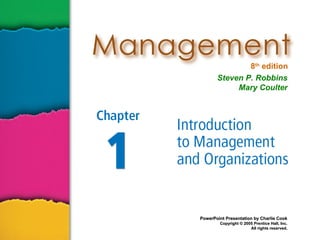More Related Content Similar to Principle of Management ch1 (20) More from julianmillar (20) 1. PowerPoint Presentation by Charlie CookPowerPoint Presentation by Charlie Cook
Copyright © 2005 Prentice Hall, Inc.Copyright © 2005 Prentice Hall, Inc.
All rights reserved.All rights reserved.
8th
edition
Steven P. Robbins
Mary Coulter
2. Copyright © 2005 Prentice Hall, Inc. All
rights reserved. 1–2
L E A R N I N G O U T L I N E
Follow this Learning Outline as you read and study this chapter.
Who Are Managers?
• Describe who is doing managerial work in today’s
organizations.
• Define who managers are.
• Explain how manager differ from non-managerial
employees.
• Discuss how to classify managers in organizations.
What Is Management?
• Define management.
• Contrast efficiency and effectiveness.
• Explain why efficiency and effectiveness are important to
management.
3. Copyright © 2005 Prentice Hall, Inc. All
rights reserved. 1–3
L E A R N I N G O U T L I N E (cont’d)
Follow this Learning Outline as you read and study this chapter.
What Do Managers Do?
• Describe the four functions of management.
• Explain Mintzberg’s managerial roles.
• Tell how a manager’s include reflection and action.
• Describe Katz’s three essential managerial skills and how
the importance of these skills changes depending on
managerial level.
• List other important managerial skills and competencies.
• Discuss the change that are impacting managers’ jobs.
• Explain why customer service and innovation are
important to the manager’s job.
4. Copyright © 2005 Prentice Hall, Inc. All
rights reserved. 1–4
L E A R N I N G O U T L I N E (cont’d)
Follow this Learning Outline as you read and study this chapter.
What Is An Organization?
• Describe the characteristics of an organization.
• Explain how the concept of an organization is changing.
Why Study Management?
• Explain the universality of management concept.
• Discuss why an understanding of management is
important even if you don’t plan to be a manager.
• Describe the rewards and challenges of being a manager.
5. Copyright © 2005 Prentice Hall, Inc. All
rights reserved. 1–5
Who Are Managers?
• Manager
Someone who works with and through other people
by coordinating and integrating their work activities in
order to accomplish organizational goals.
6. Copyright © 2005 Prentice Hall, Inc. All
rights reserved. 1–6
Classifying Managers
• First-line Managers
Are at the lowest level of management and manage
the work of non-managerial employees.
• Middle Managers
Manage the work of first-line managers.
• Top Managers
Are responsible for making organization-wide
decisions and establishing plans and goals that affect
the entire organization.
7. Copyright © 2005 Prentice Hall, Inc. All
rights reserved. 1–7
What Is Management?
• Managerial Concerns
Efficiency
“Doing things right”
– Getting the most output
for the least inputs
Effectiveness
“Doing the right things”
– Attaining organizational
goals
8. Copyright © 2005 Prentice Hall, Inc. All
rights reserved. 1–8
What Do Managers Do?
• Functional Approach
Planning
Defining goals, establishing strategies to achieve goals,
developing plans to integrate and coordinate activities
Organizing
Arranging work to accomplish organizational goals
Leading
Working with and through people to accomplish goals.
Controlling
Monitoring, comparing, and correcting the work
9. Copyright © 2005 Prentice Hall, Inc. All
rights reserved. 1–9
What Do Managers Do? (cont’d)
• Management Roles
Approach
Interpersonal roles
Figurehead, leader, liaison
Informational roles
Monitor, disseminator,
spokesperson
Decisional roles
Disturbance handler,
resource allocator, negotiator
10. Copyright © 2005 Prentice Hall, Inc. All
rights reserved. 1–10
What Do Managers Do? (cont’d)
• Skills Approach
Technical skills
Knowledge and proficiency in a specific field
Human skills
The ability to work well with other people
Conceptual skills
The ability to think and conceptualize about abstract
and complex situations concerning the organization
11. Copyright © 2005 Prentice Hall, Inc. All
rights reserved. 1–11
How The Manager’s Job Is Changing
• The Increasing Importance of Customers
Customers: the reason that organizations exist
Managing customer relationships is the responsibility of
all managers and employees.
Consistent high quality customer service is essential for
survival.
• Innovation
Doing things differently, exploring new territory, and
taking risks
Managers should encourage employees to be aware of
and act on opportunities for innovation.
12. Copyright © 2005 Prentice Hall, Inc. All
rights reserved. 1–12
What Is An Organization?
• An Organization Defined
A deliberate arrangement of people to accomplish
some specific purpose
• Common Characteristics of Organizations
Have a distinct purpose (goal)
Composed of people
Have a deliberate structure
13. Copyright © 2005 Prentice Hall, Inc. All
rights reserved. 1–13
Why Study Management?
• The Value of Studying Management
The universality of management
Good management is needed in all organizations.
The reality of work
Employees either manage or are managed.
Rewards and challenges of being a manager
Management offers challenging, exciting and creative
opportunities for meaningful and fulfilling work.
Successful managers receive significant monetary
rewards for their efforts.
